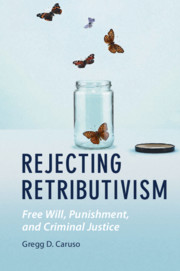Book contents
- Rejecting Retributivism
- Law and the Cognitive Sciences
- Rejecting Retributivism
- Copyright page
- Dedication
- Contents
- Acknowledgments
- 1 Free Will, Legal Punishment, and Retributivism
- 2 Free Will Skepticism
- 3 The Epistemic Argument against Retributivism
- 4 Additional Reasons for Rejecting Retributivism
- 5 Consequentialist, Educational, and Mixed Theories of Punishment
- 6 The Public Health–Quarantine Model I
- 7 The Public Health–Quarantine Model II
- 8 The Public Health–Quarantine Model III
- 9 The Public Health–Quarantine Model IV
- References
- Index
5 - Consequentialist, Educational, and Mixed Theories of Punishment
Published online by Cambridge University Press: 06 May 2021
- Rejecting Retributivism
- Law and the Cognitive Sciences
- Rejecting Retributivism
- Copyright page
- Dedication
- Contents
- Acknowledgments
- 1 Free Will, Legal Punishment, and Retributivism
- 2 Free Will Skepticism
- 3 The Epistemic Argument against Retributivism
- 4 Additional Reasons for Rejecting Retributivism
- 5 Consequentialist, Educational, and Mixed Theories of Punishment
- 6 The Public Health–Quarantine Model I
- 7 The Public Health–Quarantine Model II
- 8 The Public Health–Quarantine Model III
- 9 The Public Health–Quarantine Model IV
- References
- Index
Summary
With the case against retributivism complete, we can now ask: If we come to doubt or deny the existence of free will, or reject retributivism for other reasons, where does that leave us with regard to criminal justice? Traditionally, in addition to pure retributivism there have been a number of other common justifications of legal punishment, including consequentialist deterrence theories, moral education theories, and a variety of expressive, communicative, and mixed theories of punishment. In this chapter, I will examine these other approaches in an attempt to show that they face significant moral concerns of their own – or, in the case of mixed theories, retain certain retributive components that are unjustified. My aim will not be to refute these theories or establish that punishment is never justified. Instead, I simply want to argue that there are sufficient reasons for seeking an alternative to these nonretributive justifications of punishment. In the remainder of the book, I will then argue that the public health–quarantine model offers the best alternative.
- Type
- Chapter
- Information
- Rejecting RetributivismFree Will, Punishment, and Criminal Justice, pp. 156 - 183Publisher: Cambridge University PressPrint publication year: 2021



